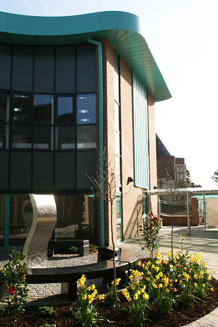
The Sir Henry Wellcome Building for Mood Disorders Research
New £3.6 million mood disorders research facility opens its doors
The South West region is set to benefit from a new £3.6 million building dedicated to researching treatments for mood disorders such as depression and Bipolar Disorder.
The Sir Henry Wellcome Building for Mood Disorders Research will be officially launched on 29 March 2012 by Director of the Wellcome Trust, Sir Mark Walport.
Up to 400 people a year could receive treatment provided at the new facility through its clinical research.
The Sir Henry Wellcome Building for Mood Disorders Research provides state-of-the-art facilities to carry out experimental and applied clinical research into mood disorders. Funded by the Wellcome Trust Capital Awards in Biomedical Science initiative, the new development is on the University’s Streatham Campus.
The Mood Disorders Centre (MDC) is a partnership between the NHS and the University of Exeter. It provides a centre for psychological research, assessment, treatment and training that aims to benefit all people who suffer from mood disorders. The MDC benefits from good NHS links, with a specialist treatment service for severe and recurrent depression commissioned by the Devon Primary Care Trust (PCT).
This new clinical research facility houses individual and group treatment rooms, with built-in audiovisual recording. The funding has also provided a virtual reality laboratory that includes advanced technologies in order to conduct research into the processes influencing emotional regulation.
Director and Co-founder of the Mood Disorders Centre, Professor Ed Watkins said: “This building is the culmination of eight years of work which started in 2004 when the Mood Disorders Centre was founded. We are grateful to the Wellcome Trust for funding what we believe to be amongst the best facilities for psychological treatment research anywhere in the world.
“Common mental health disorders are a major global health challenge, with an estimated 121 million people worldwide suffering from depression. The Mood Disorders Centre seeks to address this challenge by bringing together world-class clinical training and research to develop understanding into mood disorders, translate that understanding into new approaches to treatment and make these new treatments widely accessible and available to patients in a cost-effective way.
“We look forward to the new advances and insights that this facility will support, and we are excited to see where the future will take us.”
The Mood Disorders Centre is already known globally for its research into specific features of mood disorders, such as depressive rumination, and new psychological treatments, such as Mindfulness-Based Cognitive Therapy. Research at the Mood Disorders Centre has provided significant contribution to national guidelines on the treatment of depression, including the Improving Access to Psychological Therapies programme implemented by the government in 2008. Under this programme waiting times for treatment have reduced from 18 months to a few weeks and 900,000 more people have been treated for depression and anxiety nationwide.
The Mood Disorders Centre will also help train the next generation of clinical researchers and practitioners. The University of Exeter recently launched the UK’s first Applied Psychology (Clinical) degree, which has been awarded dual accreditation from the British Psychological Society, both as a psychology degree and for a training component that supports eligibility for professional accreditation as a Psychological Wellbeing Practitioner shortly after graduation.
Following today’s official launch events, the Centre will host a science conference on Friday 30 March and a public engagement day on Saturday 31 March. Visit the Mood Disorders Centre for further details.
Date: 29 March 2012

